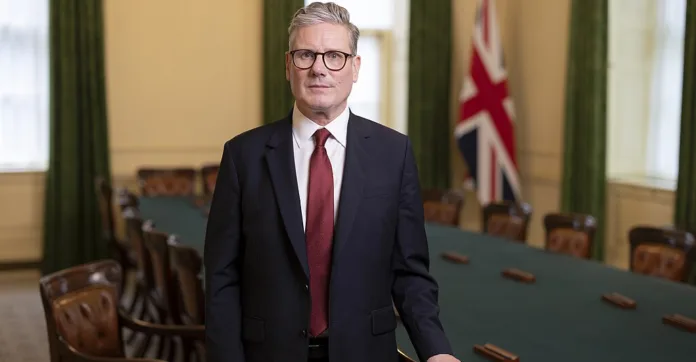Prime Minister Keir Starmer’s promise to mend ties with Europe is met with relief and optimism across European media, signalling a fresh start in UK-EU relations
European media have responded positively to UK Prime Minister Keir Starmer’s pledge to overhaul the UK’s relationship with Europe, reflecting a shift from years of strained interactions. The new approach was unveiled during a meeting of the European Political Community at Blenheim Palace in Oxfordshire, where Starmer sought to end a period marked by contentious relations and political instability.
Annette Dittert, the London correspondent for German public broadcaster ARD, expressed enthusiasm for the change, noting that Starmer’s swift efforts have begun to restore Britain’s reputation. Dittert’s remarks highlighted the dramatic shift in tone, signalling a departure from the previous negative perceptions of Britain.
Embed from Getty ImagesDer Spiegel echoed this sentiment, observing a notable improvement in UK-Germany relations under Starmer’s leadership. The publication suggested that Starmer’s performance could lead to a new era of collaboration between Berlin and London, particularly in areas such as security, defence, and economic cooperation. This renewed partnership is seen as crucial, especially with potential shifts in global leadership dynamics, including the possible return of Donald Trump and the challenges facing French President Emmanuel Macron.
In France, Le Monde contrasted Starmer’s rising influence with the weakened position of President Macron. The paper emphasized that while Starmer must navigate relationships with both Macron and future French governments, his efforts to mend ties with the EU are critical for overcoming the divisions caused by Brexit.
La Repubblica in Italy underscored that the UK’s rapprochement with the EU is now officially underway, marking a significant diplomatic shift. Similarly, La Vanguardia in Spain noted that the focus has shifted from Brexit (“B word”) to the “reset” of relations (“R word”), with Starmer aiming to reverse the trajectory set by his predecessors.
In Ireland, the Irish Times described the diplomatic atmosphere at Blenheim Palace as warm and hopeful, reflecting the positive reception of Starmer’s initiatives. The paper noted that Starmer’s approach could lead to lasting improvements in UK-EU relations.
María Ramírez from Spanish online newspaper elDiario.es highlighted that Starmer’s messaging at the forum was clear: his government is committed to revitalizing relations with the EU and focusing on rebuilding respect for international law, in contrast to previous administrations’ stances.
The Guardian
Keir Starmer’s recent push for a “reset” in UK-EU relations has been met with widespread approval across Europe. Addressing leaders at the European Political Community meeting in Blenheim Palace, Starmer expressed his intent to mend ties strained by years of turbulent leadership.
European media outlets have responded positively to Starmer’s initiative. Annette Dittert of ARD highlighted the swift improvement in Britain’s reputation, noting that the change in tone is a relief after years of negative coverage. Der Spiegel reported that the new rapport between Starmer and German Chancellor Olaf Scholz could herald a renewed European partnership, especially given shifting global political dynamics and the potential return of Donald Trump.
Le Monde observed the contrast between Starmer’s rising influence and French President Emmanuel Macron’s weakened position, emphasizing that Starmer’s success in restoring relations with France will be crucial for the reset. Similarly, La Repubblica in Italy acknowledged the official start of improved EU relations.
Spanish and Irish media also underscored the significance of this diplomatic shift. La Vanguardia noted a move away from negative perceptions towards a focus on positive reform, while the Irish Times praised Starmer’s diplomatic efforts, hoping for enduring warmth in relationships across Europe.
Overall, Starmer’s commitment to rebuilding the UK’s standing in Europe, particularly through respect for international law, represents a notable departure from the previous administration’s approach, aiming to foster cooperation on various fronts including security, economic ties, and migration.
Sky News
Prime Minister Keir Starmer has announced a significant £84 million investment aimed at addressing the migration crisis by tackling its root causes. Speaking at the European Political Community (EPC) summit at Blenheim Palace, Starmer detailed how the funds would be allocated to health and education projects in African and Middle Eastern countries, as well as humanitarian support to address the conditions driving people to flee their homes.
The funding includes £13 million for migration development programs in North and East Africa, £21 million for key host and transit countries like Libya and Ethiopia, £26 million for Syrian refugees in the Middle East, and £24 million to support communities in Sudan, Chad, and Ethiopia. Additionally, £2 million will support the International Organisation for Migration’s projects in Libya.
Starmer criticized the previous Conservative government’s approach, particularly the Rwanda deportation scheme, labelling it a “gimmick” that failed to address the underlying issues of migration. He emphasized that practical, legally sound solutions are needed to address illegal migration and national security concerns, rather than symbolic measures.
The Prime Minister also highlighted his administration’s efforts to enhance cooperation with European partners, including increasing the UK’s involvement with Europol and establishing new agreements with Slovenia and Slovakia on tackling organized crime. These steps are part of a broader strategy to dismantle smuggling networks and improve border security.
Starmer acknowledged the challenge of reversing the previous administration’s policies and emphasized the need for comprehensive and practical approaches to manage migration effectively. He stressed that while immediate results are not expected, his government is committed to making substantial progress in addressing the migration crisis and strengthening ties with European allies.
